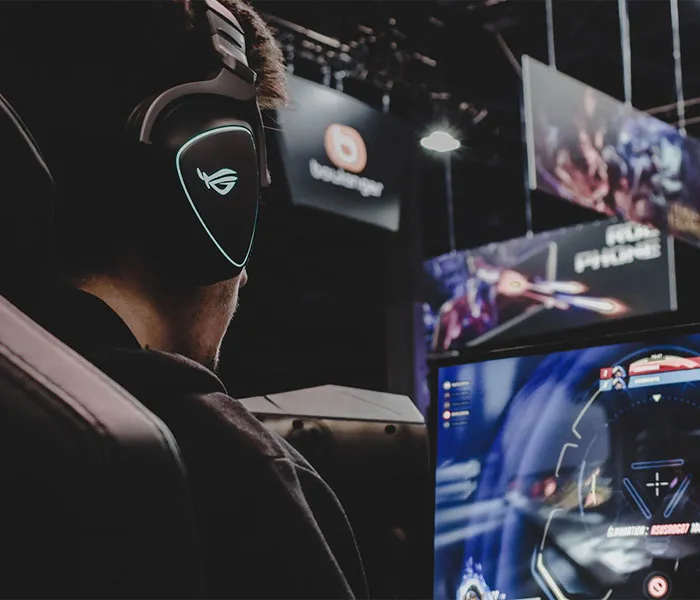- Short Period InsuranceShort Period Insurance
If you are planning a production which is scheduled for 90 days or less, Performance can provide you with cover at a time that is convenient for you.
- Annual InsuranceAnnual Insurance
Flexible insurance for 12 months’ giving you the cover and protection that you need.
- GamesGames
At Performance Gaming, we understand that the gaming industry is more than just entertainment, it’s innovation, creativity and passion.
- Who We CoverWho We Cover
At Performance Film & Media, we support those within the media industry with bespoke insurance policies, catered to their profession. From studio and film insurance to freelancers and agencies, we help you stay protected.
- Film & TVFilm & TV
Specialists in media, tv and film insurance. We arrange cover for production companies, film makers, studios and much more. Suitable for limited companies, sole traders, partnerships or freelancers.
- Drone InsuranceDrone Insurance
The use of UAV’s/drones in film & video production is really taking off. At Performance Film & Media, we ensure sure you have the right cover with bespoke drone operators insurance for commercial purpose.
ANNUAL INSURANCE
- Equipment Hire Company InsuranceEquipment Hire Company Insurance
Protect your equipment whether in your care or going out on hire with comprehensive equipment hire insurance. See our newly developed anti fraud app for further protection for hire companies.
ANNUAL INSURANCE
- Film InsuranceFilm Insurance
Whether you are preparing for a short-term production or a feature length film, Performance Film & Media can offer varied levels of film insurance cover to ensure that those involved, the equipment, media and budget are protected.
SHORT PERIOD & ANNUAL INSURANCE
- Filmmakers InsuranceFilmmakers Insurance
We understand that filmmakers need flexibility when it comes to insurance. From no-budget one day shoots to elaborate worldwide productions, we’ve got you covered with expert film makers insurance.
SHORT PERIOD & ANNUAL INSURANCE
- Film & Media Students InsuranceFilm & Media Students Insurance
Students are perceived to carry more of a risk due to their ‘inexperience’ when compared to ‘professional’ production companies. That is why we offer bespoke insurance for film & media students.
SHORT PERIOD & ANNUAL INSURANCE
- Film Production InsuranceFilm Production Insurance
From early ideas and planning through to shooting, production and the final screening, filmmaking involves multiple processes across multiple professions and, therefore, creates more room for something to go wrong.
SHORT PERIOD & ANNUAL INSURANCE
- Film Schools InsuranceFilm Schools Insurance
Supporting leading film schools and the industry professionals of tomorrow with comprehensive film school insurance. Annual cover available for the whole year group or the school itself.
ANNUAL INSURANCE
- Production InsuranceProduction Insurance
Television and film production insurance is a must-have in the industry. Producers, filmmakers, film crew, equipment and filming locations are all protected from liability claims with a good production insurance policy. That’s why we have a dedicated team of professionals ready to respond quickly when you need support.
SHORT PERIOD & ANNUAL INSURANCE
- Production Company InsuranceProduction Company Insurance
Working on a production often involves going that extra mile, and so does our cover. Offering production company insurance whether you are working in your studio or at any worldwide location.
SHORT PERIOD & ANNUAL INSURANCE
- Studio InsuranceStudio Insurance
We know your studio is more than just a building. It could be the heart of the action – where you store expensive equipment, sets, props or content media like hard drives and tapes. Or it could be the space you use to hire out staging facilities, green screens or for rehearsals. Whichever type of studio you run, the risks will vary.
SHORT PERIOD & ANNUAL INSURANCE
- TV Production InsuranceTV Production Insurance
TV productions can be a huge undertaking, involving large casts and crews, far-flung filming locations, studio hire, equipment hire, and so much more. At Performance, we understand how quickly something can go wrong – and how expensive that can be to right.
SHORT PERIOD & ANNUAL INSURANCE
- Drone InsuranceDrone Insurance
- Media InsuranceMedia Insurance
Performance Film & Media is able to provide comprehensive insurance cover to the film and media industry. We have placed cover for a variety of different businesses in digital media, consultancy and publishing, all for the creative industry.
SHORT PERIOD & ANNUAL INSURANCE
- Advertising Agency InsuranceAdvertising Agency Insurance
Helping you protect your business and reputation with our extensive advertising agency insurance cover. Offering a range of covers from a variety of specialist media insurance companies.
ANNUAL INSURANCE
- Animation Studio InsuranceAnimation Studio Insurance
Our animation insurance offers cover ranging from your own equipment to public and product liability and much more. Our tailored insurance is here to protect you and your creative projects.
ANNUAL INSURANCE
- Post-Production Company InsurancePost-Production Company Insurance
Whether it’s to do with film or digital, audio, visual or CGI, we can offer specialist post production insurance that doesn’t get lost in the edit. Protecting your business, your property and your client.
ANNUAL INSURANCE
- Advertising Agency InsuranceAdvertising Agency Insurance
- Games Developers & Publishers InsuranceGames Developers & Publishers Insurance
Being at the forefront of exciting, interactive innovation can lead to developers being exposed to areas of risk. Game developers insurance protects you against those risks.
ANNUAL INSURANCE
- Influencer & Content Creators InsuranceInfluencer & Content Creators Insurance
The risks of influencing an audience can be huge and we have a policy designed to safeguard your social interaction. Influencer & Content Creators Insurance will cover your legal costs and damages.
ANNUAL INSURANCE
- Freelancer InsuranceFreelancer Insurance
From working with freelancers, we know each day can bring a different challenge. Therefore we provide freelancer insurance cover that is flexible enough to adapt when your circumstances change.
SHORT PERIOD & ANNUAL INSURANCE
- Film & TVFilm & TV
- Our CoverOur Cover
Performance Film & Media provides insurance policies to cover business interruption, liability, equipment breakdown and much more. Designed for those in the film and media industry.
- Business Travel InsuranceBusiness Travel Insurance
Business Travel Insurance covers you for accidental injury, loss or damage to property arising during any journey undertaken on behalf of the business. This policy also covers leisure trips.
SHORT PERIOD & ANNUAL INSURANCE
- Business Interruption InsuranceBusiness Interruption Insurance
Business Interruption Insurance, also known as loss of profit insurance, covers you for loss of income should there be material damage to your property which prevents you from continuing to trade.
ANNUAL INSURANCE
- Cyber Liability InsuranceCyber Liability Insurance
Cyber Liability Insurance also known as Cyber Insurance will help you deal with the aftermath of a cyberattack. We can’t prevent the attack but can help you rebuild your business should it happen.
ANNUAL INSURANCE
- Employers’ Liability InsuranceEmployers’ Liability Insurance
Usually a legal requirement if you engage the services of someone who will work under your supervision or control. Employers’ Liability Insurance will cover you worldwide for employees that domicile in the UK.
SHORT PERIOD & ANNUAL INSURANCE
- Equipment Breakdown InsuranceEquipment Breakdown Insurance
Equipment Breakdown Insurance, also known as Mechanical Breakdown, will cover the cost to replace or repair technical equipment should a loss be suffered due to an internal breakdown or operator error.
ANNUAL INSURANCE
- Errors & Omissions InsuranceErrors & Omissions Insurance
Errors and Omissions Insurance also known as Media Liability Insurance ensures you are protected for legal defence costs you may incur and insures you against damages as a result of a claim.
ANNUAL INSURANCE
- Hired in Equipment InsuranceHired in Equipment Insurance
Hired in Equipment Insurance, also known as plant hire, will indemnify you for the repair or replacement of equipment that is hired, leased to or borrowed by you. Covers accidental damage, fire and theft.
SHORT PERIOD & ANNUAL INSURANCE
- Management Liability InsuranceManagement Liability Insurance
Management Liability Insurance, also known as Directors and Officers Liability insurance, covers any Director, Officer or Member of the Company for loss arising from a claim being made against them.
ANNUAL INSURANCE
- Multimedia InsuranceMultimedia Insurance
Multimedia Insurance, also known as All Risks Negatives, protects your actual shot media should it be lost or damaged throughout production. Covers the cost to re-create the footage or reimburse the amount spent.
SHORT PERIOD & ANNUAL INSURANCE
- Own Technical Equipment InsuranceOwn Technical Equipment Insurance
Own Technical Equipment Insurance will indemnify you for the repair and/or replacement for your own equipment that you have purchased. This will also cover any props, costumes, computers and/or mobiles phones.
ANNUAL INSURANCE
- Personal Accident InsurancePersonal Accident Insurance
Personal Accident Insurance covers you and your nominated staff, including freelancers if you choose to increase the cover, for accidental bodily injury. Also offers weekly payments for disablement.
ANNUAL INSURANCE
- Producers’ Indemnity InsuranceProducers’ Indemnity Insurance
Following an insured loss, Producers’ Indemnity Insurance or Production Cover provides the funds to complete your production, or reimburses what you have spent should you have to abandon the project.
SHORT PERIOD & ANNUAL INSURANCE
- Professional Indemnity InsuranceProfessional Indemnity Insurance
Professional Indemnity Insurance protects professionals and their businesses in the event of a claim being made by a client or third party due to loss as a result of non-performance or breach of contract.
ANNUAL INSURANCE
- Public Liability InsurancePublic Liability Insurance
Public Liability Insurance provides cover for you in the event that you or your employees cause injury to a Third Party or damage their property. Protecting your legal liability to pay compensation and the costs.
SHORT PERIOD & ANNUAL INSURANCE
- Business Travel InsuranceBusiness Travel Insurance
- Short Film Competition 2025Short Film Competition 2025
Short Film Competition 2025
- About UsAbout Us
Performance Film and Media are part of the Aston Lark group and are proud to be one of the top five independent Chartered Insurance Brokers in the Country.
- News & ViewsNews & Views
Keep up to date with all the latest goings on within the film & media industry.
- Get a QuoteGet a Quote
Use our online form to request a quote or call our contact number for further assistance.
- Account LoginAccount Login
- Contact UsContact Us
The Performance office is based in Croydon, see our contact details to get in touch.


